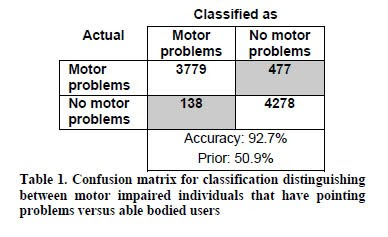Comments: Aaron
Summary:
There are people in the world that would love to use computers but are physically unable to do the tasks necessary to run something on a computer. This article deals with "pointing" on a computer which basically consists of clicking an item, dragging it and dropping it somewhere, and just moving the mouse to a target that they want to click. In order to adapt to a user with different disabilities it is necessary to create software that will assess the user and automatically change to make it easier for each individual to use a computer. Statistical models were constructed during tests on participants. Each model found correlations between the "occurrence of certain features and and the occurrence of the property it tries to predict. Once a model is created it can figure out if the user will benefit from an adaptation to the software to fit their needs. In order to begin they took a group of people to test the differences in missed clicks, movement speed, and other data that would help design adaptable software. There was a group of people who had no disabilities, and a group that did and the data sets were compared.
 They also compared data between young adults, adults, older adults, and individuals with Parkinson's disease. They found that older adults took much longer to reach peak velocity than it did the young adults and "adults". Individuals with Parkinson's had the slowest peak velocity and they also seemed to pause near the end of their movements. Based off this data they created a model to distinguish the differences between each group. The accuracy results are shown below.
They also compared data between young adults, adults, older adults, and individuals with Parkinson's disease. They found that older adults took much longer to reach peak velocity than it did the young adults and "adults". Individuals with Parkinson's had the slowest peak velocity and they also seemed to pause near the end of their movements. Based off this data they created a model to distinguish the differences between each group. The accuracy results are shown below.Now that they had a good model for detecting what group a person falls into, they wanted to develop a system to predict if a user would benefit from an adaptation of the software they are using. This statistical model had 94.4% accuracy. With such high accuracies on each test they have done they are going to in the future actually try to build software that can automatically asses a user's performance and adapt to their needs.
Discussion:
I think adaptable software for people with certain disabilities that are keeping them from enjoying computer use would be something very useful. Everyone should be able to enjoy computers that wish to and if there is a possibility that we could make this possible then why not do it. I think this software has really good potential for users with disabilities when dealing with every day computing, but also may help people in the gaming world as well. It should be interesting to see what happens if this software is actually developed.

No comments:
Post a Comment